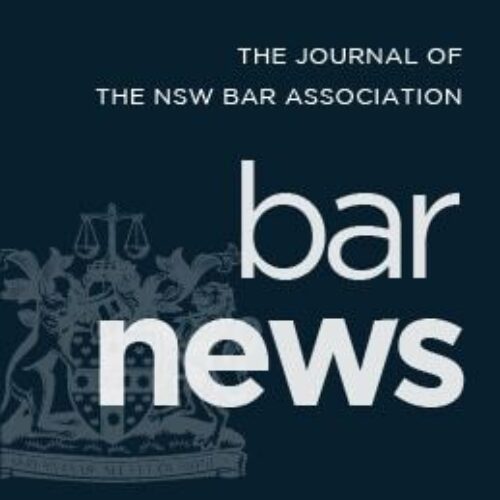- Winter 2024
- Procedural fairness in anti-corruption commissions

AB (a pseudonym) v Independent Broad-based Anti-corruption Commission [2024] HCA 10
In an investigation into unauthorised access to and disclosure of internal email accounts of a public body (‘CD’), the Victorian Independent Broad-based Anti-corruption Commission (‘IBAC’) provided ‘AB’, a senior officer of CD, a redacted version of its draft report and requested his response. The draft report contained proposed findings adverse to AB and CD.
IBAC declined to provide to AB transcripts of other witnesses’ examinations or documentary material relied upon to support the proposed adverse findings.
The High Court considered relevant provisions of the Independent Broad-based Anti-corruption Commission Act 2011 (Vic) (the ‘Act’), construed against common law principles of natural justice. The provisions require that if IBAC intends to include in a special report ‘a comment or opinion’ that is adverse to any person, IBAC must first provide that person a reasonable opportunity to respond to the ‘adverse material’. The High Court found the ‘adverse material’ refers to the evidentiary material said by IBAC to justify a ‘comment or … opinion which is adverse to any person’, which in the circumstances of the case constituted the evidence as outlined in the draft special report.
While the High Court’s judgment concerns the legislation of the Victorian IBAC, the approach and principles applied in its interpretation are instructive, particularly in the construction of similar New South Wales legislation that confers power, the exercise of which is likely to affect a person’s interests.
Background
IBAC’s investigation was conducted between 2019 and 2021. CD was a registered organisation under the Fair Work (Registered Organisations) Act 2009 (Cth). During the investigation, AB gave evidence to IBAC in a private examination.
At the conclusion of the investigation, IBAC provided to AB a redacted draft of its special report, which it proposed to transmit to each house of Parliament under relevant provisions of the Act, and requested his response. The draft report contained proposed findings adverse to AB (and others) in relation to unauthorised access and disclosure of information by, and the workplace culture of, CD and reasons for those findings.
AB sought that IBAC provide him with the transcript of his examination, transcripts of other witnesses’ examinations referred to in the draft report, and other documentary material relied upon to support the proposed adverse findings. IBAC provided AB with the transcript of his examination and documents shown to him during the examination but not the other requested documents.
In the Victorian Supreme Court, the appellants contended, inter alia, that IBAC had contravened s 162(3) of the Act by failing to provide them with a reasonable opportunity to respond. Section 162(3) provides that if IBAC intends to include in a special report ‘a comment or an opinion’ that is adverse to any person, then IBAC must first provide that person a reasonable opportunity to respond to the ‘adverse material’ and fairly set out each element of the response in its report.
At first instance, ‘adverse material’ was construed to mean ‘the material upon which IBAC’s adverse comments or opinions contained in the draft report were based’: at [9]. However, it was found that it was sufficient if IBAC provided ‘the substance or gravamen of the adverse material’, which was contained in the redacted draft report: at [9].
The Court of Appeal refused leave to appeal, holding that ‘adverse material’ refers to ‘a comment or opinion which is adverse to any person’ and not the material upon which it was based: at [11]. The court found that the draft report set out the terms of the comments and opinions that were adverse to the appellants and the substance or gravamen of the matters that IBAC took into account: at [11].
High Court
A unanimous High Court stated that the interpretation of s 162(3) must ‘begin with a consideration of the text itself’, that is, the text of the statute as a whole: at [21]. Ascertaining the meaning of the text requires a consideration of its context, which includes the general purpose and policy of a provision and, in particular, the mischief it is seeking to remedy: at [21].
The court compared s 162(3) with s 162(2), in which IBAC’s obligation is engaged where it intends to include in a special report an ‘adverse finding’ about a public body (whereas s 162(3) concerns findings, comments and opinions adverse to any person): at [22]. Relevantly to both provisions, the court observed that the potential damage to the interests, including the reputation, of a public body, public officer or other person from the publication of a special report containing a conclusion that they engaged in corrupt conduct was manifest: at [22].
The text suggested that ‘adverse material’ was something different from ‘adverse findings’ and ‘comment or … opinion which is adverse’: at [24]. In construing that phrase, it was important to begin by identifying basic propositions about the applicable common law principles of natural justice where a person’s interests are likely to be affected by an exercise of power. First, such a person must be given an opportunity to deal with relevant matters adverse to their interests, which the repository of power proposes to take into account: at [25], quoting Kioa v West (1985) 159 CLR 550 (‘Kioa v West’): at 628 (Brennan J).
Second, the person whose interests are likely to be affected does not have to be given an opportunity to comment on every adverse piece of information, irrespective of its credibility, relevance or significance. However, ordinarily, an opportunity should be given to deal with adverse information that is credible, relevant and significant to the decision to be made. At least in some contexts, that includes an opportunity to respond to information obtained from third parties, even if not expressly relied on by the decision-maker: at [25], quoting Kioa v West: at 629.
The nature of the power and capacity to affect a person’s rights and interests bears upon the existence and informs the content of any duty of procedural fairness. It also informs the proper construction of statutory provisions that create analogous rights and obligations, in that ‘all statutes are construed … against a background of common law notions of justice and fairness’: at [26], quoting Kioa v West: at 609 (Brennan J). The court observed that IBAC was given broad and intrusive powers, with potentially grave consequences for an affected public body, public officer or other person: at [26].
Sections 162(2) and (3) modify the common law obligation to afford procedural fairness so as to require a connection between ‘adverse material’ and proposed ‘adverse findings’, ‘comment or … opinion’. Otherwise, the scope and nature of IBAC’s powers, considered in the context of common law principles, confirmed that ‘adverse material’ refers to the ‘adverse information’ said to justify the proposed comments or opinions (and not the comments or opinions themselves): at [27].
Thus, the provisions required that the person affected be given the opportunity to respond to the evidentiary material said to justify the adverse findings, comments or opinions: at [27], [32]. In most cases, it would be expected that a reasonable opportunity to respond will be afforded by proffering that opportunity in respect of the substance or gravamen of the material, which will usually involve a full account of its essential content. In some cases, more may be required: at [32].
Here, but for one instance, the draft report set out the substance or gravamen of the matters that IBAC took into account in formulating its adverse comments or opinions, sufficiently to comply with ss 162(2) and (3): at [35]–[36]. The exceptional instance was a statement in the draft report that ‘[o]ther concerns were also raised about providing evidence against [CD] or [AB]’. This statement was so general and lacking in content that the appellants could not respond to it: at [37]. It was insufficient that they could respond by criticising its lack of detail or request its deletion: at [40]. However, before the High Court, IBAC undertook that it would not transmit a report containing that comment, and it followed that, other than noting the undertaking, no substantive relief was warranted: at [41]–[42].

Conclusion
The provisions of the Independent Commission Against Corruption Act 1988 (NSW) (‘ICAC Act’) are not ad idem with the corresponding Victorian Act. Under its legislation, the Independent Commission Against Corruption is not authorised to include an adverse finding against a person in a report for Parliament absent a reasonable opportunity for the person to respond to the proposed finding in advance and, if requested, including a summary of the person’s response: s 79A(1) ICAC Act. Other provisions of the ICAC Act are also directed to the scope and content of procedural fairness and the protection of reputations.
In addition, for instance, statutory guidelines required to be issued under the ICAC Act are to provide for matters such as investigation and disclosure of evidence that might be exculpatory, opportunity to cross-examine witness as to credibility, and access to relevant documents and a reasonable time to prepare in the conduct of public inquiries: s 31B ICAC Act.
While the governing legislation is not directly analogous, nonetheless, the judgment in AB (a pseudonym) v Independent Broad-based Anti-corruption Commission [2024] HCA 10 demonstrates the appropriate approach to and considerations in the proper construction and application of the New South Wales legislation.
